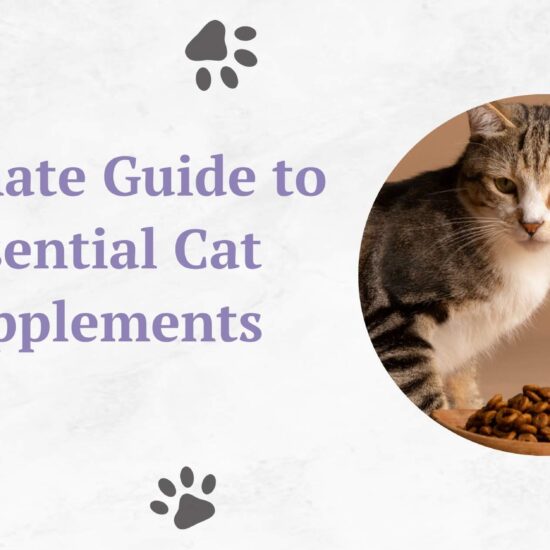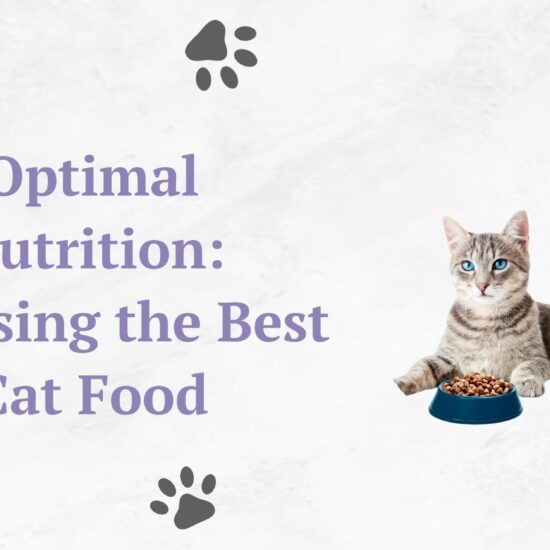Food is essential for the survival of living beings. Nutritional food enhances health and well-being whereas spoiled and allergic food items can be injurious.
Introduction
As a responsible pet owner, you should know about food items that can be allergic to your dogs, along with the major symptoms and effective ways to treat them.
If you own a dog and are curious to know more about dog food allergies, you have just arrived at the right place. This article offers a comprehensive understanding of dog food allergies and tips for improving gut health in dogs.
Understanding Dog Food Allergies and Improving Gut Health

Dogs, our loyal furry companions, often experience food allergies, impacting their overall well-being. These allergies can provoke various distressing symptoms and degrade their gastrointestinal health. However, identifying the triggers and nurturing their gut health can significantly resolve these issues, ensuring your furry friend remains happy and healthy.
Major Allergic Food Items for Dogs
Determining the root cause of a dog’s food allergy is crucial to managing their diet and reducing the health risks. Ensure that these food items are not given to them to eat. Several common food items frequently trigger allergic reactions in dogs, including the following:

- Protein Sources: Several proteins, like beef, chicken, lamb, and fish, are primary causes of food allergies in dogs. Even grains, often blamed for allergies, aren’t as common as protein allergies in dogs.

- Dairy Products: Lactose intolerance or allergic reactions to dairy products can cause digestive problems in many dogs. Watch out for symptoms after consuming milk, cheese, or yogurt. Reduce and remove them from their diet.
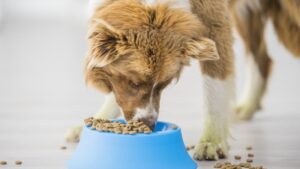
- Wheat and Corn: While less prevalent, some dogs exhibit allergic responses to grains like wheat and corn. Sensitivities to gluten and certain proteins in these grains might trigger adverse reactions. Determine if it is happening and take the necessary steps.

- Soy Products: Soy is another potential allergen for dogs. It can induce skin irritations, gastrointestinal issues, or even more severe allergic reactions.
Major Symptoms of Food Allergy
Detecting food allergies in dogs involves recognizing the specific symptoms they exhibit. You should know the major symptoms to avoid further damage. These symptoms may vary but typically manifest in the following ways:

- Skin Reactions: Itching, scratching, redness, hives, and chronic skin infections are typical allergic responses in dogs. Excessive licking or chewing at certain body parts could also indicate skin allergies.

- Gastrointestinal Distress: Food allergies might lead to vomiting, diarrhea, flatulence, or irregular bowel movements. Persistent digestive issues may signify an allergic reaction to certain ingredients in their diet.

- Ear Infections: Recurrent ear infections or inflammation in a dog’s ears can be a manifestation of food allergies.
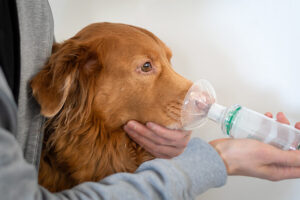
- Respiratory Problems: In severe cases, food allergies can cause breathing difficulties, coughing, or sneezing.
Note: There might be affiliate links mentioned here. We may receive a commission if you purchase a product through an affiliate link. There is no additional charge for you. Please do your own research before making any online purchases.
How to Treat Dog Food Allergies
Once you determine the symptoms of allergies, you need to take appropriate measures to resolve the issues. Addressing a dog’s food allergy involves several strategies aimed at treating the symptoms and managing their diet effectively:

- Elimination of Food Items to Identify the Allergic Ones: Identifying the allergen is crucial. Implement an elimination diet by gradually removing certain food items from their diet, observing for improvements, and then reintroducing items to pinpoint the specific trigger.

- Switch to Novel Protein and Diet with Limited Ingredients: Switch to hypoallergenic diets comprising novel protein sources (venison, duck, or rabbit) and limited ingredients, excluding common allergens.
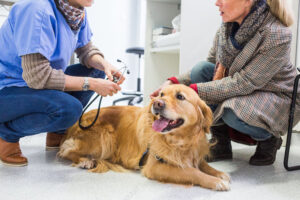
- Veterinary Consultation: Seek advice from a veterinarian to diagnose and devise an appropriate treatment plan tailored to your dog’s specific allergy profile. Allergy testing or prescription diets might be recommended.

- Probiotics and Digestive Enzymes: Incorporate probiotics and digestive enzymes into your dog’s diet. These supplements can aid in better digestion, alleviate gastrointestinal issues, and enhance gut health.
Tips to Enhance Dog Gut Health
Nutritional food and gut health are crucial aspects of the health of a living being. Maintaining optimal gut health plays a vital role in your dog’s overall well-being, particularly in managing food allergies. Follow the below-mentioned strategies to enhance their gut health.
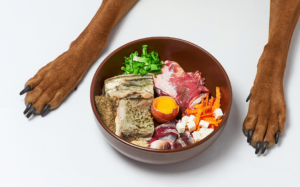
- High-Quality, Balanced Diet: Offer premium quality, nutritionally balanced meals to your furry friends to eat. Choose diets rich in whole foods, high-quality proteins, and essential nutrients to support digestive health.

- Probiotics and Prebiotics: Probiotics contain beneficial bacteria that aid in digestive health. Incorporate prebiotic-rich foods like bananas, oats, and barley to support the growth of these good bacteria.
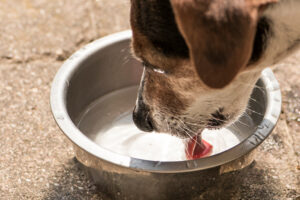
- Hydration and Freshwater: Hydration is crucial for the good health of any living being, including dogs. Ensure your dog stays well-hydrated. Access to clean, fresh water is essential for good digestion.

- Regular Exercise: A sedentary lifestyle often leads to many health issues. Regular physical activity can boost metabolism, improve digestion, and contribute to overall gut health.

- Stress Management: Minimize stress, as it can impact gut health. Engage your dog in activities they enjoy, provide a comforting environment, and maintain a consistent routine.
Conclusion
In conclusion, recognizing and managing food allergies in dogs is crucial for their health and well-being. By identifying allergens, providing a balanced diet, and nurturing gut health, you can ensure your beloved canine companion lives a healthy, allergy-free life.





